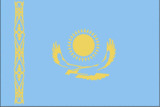 Dina Galyeva is the organizational counterpart for Andrew Holets, and deputy director of the HIV/AIDS and drug abuse NGO, Public Foundation “Challenge”. This is part one of a tentatively-scheduled four-part series of guest columns from Ms. Galyeva detailing her interactions with Andrew, the experience of non-government health sector work, and her life in general. Each article is written in her strongest language, Russian, and translated by Andrew, weakly. Russian will appear first, and the English translation afterward.
Dina Galyeva is the organizational counterpart for Andrew Holets, and deputy director of the HIV/AIDS and drug abuse NGO, Public Foundation “Challenge”. This is part one of a tentatively-scheduled four-part series of guest columns from Ms. Galyeva detailing her interactions with Andrew, the experience of non-government health sector work, and her life in general. Each article is written in her strongest language, Russian, and translated by Andrew, weakly. Russian will appear first, and the English translation afterward.Помню, как первый раз увидела Эндрю, это было в Алмате, ну или почти, там есть поселок городского типа Талгар. Нас пригласил Корпус Мира на семинар и встречу с новыми волонтерами.
В первый день, в первой половине дня, занятия проходили отдельно от волонтеров, только кураторы, и нас еще не знакомили с нашими…Только показали нарисованную карту РК, где были наклеены фото волонтеров, но на наш город было аж три человека, и кто именно будет работать у нас в «Challenge», я не знала, даже не знала кто это будет девушка или парень…, было даже немного страшновато, ведь работать целых два года…
После обеда нас решили представить друг-другу, ну я как всегда опоздала, стояла в очереди за пирожками J, прихожу и вижу картину…, все кураторы уже довольно мило общаются со своими волонтерами, а что делать мне, и где мой «чувак» или «чувиха», фиг его знает…Ну все думаю, «капец», разобрали всех симпотных и умных, а мне где???
Только вижу, стоит посреди холла, какой то красавчик похожий на латино - американца или на испанца, совершенно один, но я и подумать не могла, что это ОН…, наш волонтер, что может так повезти. Уф…! Да это был Andrew, мы стали с ним знакомиться, я даже боялась что либо на английском сказать, с языком то у меня не очень, думаю…, вдруг подумает, что я совсем полный «тупик», ну ни чё, разговорились, он оказался не только очень красивым, но и умным, сообразительным, коммуникабельным, еще и с чувством юмора, короче, «клЁвый» такой…
Сразу позвонила шефушке, mss. Бондаревой (этА наш директор ОФ «Challenge», Елена Владимировна) и сразу же обрадовала ее, что задание выполнено, везу умного и красивого, ну там тоже радости не было предела…
После завершения семинара, все стали разъезжаться по городам, кто куда и наше время пришло, Павлодар, домой…!!!
Вот так мы и познакомились впервые.
Уже полтора года, мы работаем вместе и мы отличная компания, отличные друзья!
I remember the first time I saw Andrew; it was in Almaty, well almost, it was there in a village-type urban setting named Talgar. We were invited by the Peace Corps to the seminar and to meet with new volunteers. On the first day, in the morning, classes were held separately from the volunteers –counterparts only—and we were not yet familiar with our volunteers… Only pictures were shown on a map of Kazakhstan, where the glued photos showed the volunteers, but in our city were three people, and whoever will work with us in the "Challenge" Foundation, I did not know…I did not even know whether it will be a girl or guy…, it was even slightly frightening, to think of this as someone for two years to work with…
After lunch, we decided to present ourselves to one another, and as usual, I was late, standing in the line with a little cake in hand J, in order to see the picture on the map… all the other counterparts were quite nice and could communicate with their volunteers and what can I do, and where is my "Dude" or "Dudette", God knows who or where… Well, all I think, "That's it!", all around me are goodlooking and smart people, but what do I get? Only then do I see in the middle of the hall, someone similar to that handsome Latino - American or Spaniard looking person on that photo on the map. This is the one, but I could not think that this HIM…, our volunteer, which may very well be my luck. Uf…! Yes, it was Andrew, and as I became acquainted with him, I was nervous of my speech in English, the language I have not, and I think…suddenly that I am in quite the full "standstill", nor speaking, for he was not only very beautiful but also intelligent, cultured, sociable, and even humorous…basically, "awesome" as it may… Immediately I called the boss, Ms. Bondareva (aka our director of Public Foundation "Challenge", Elena) and immediately rejoiced to her that the job is done, and that he’s very smart and beautiful, and well, there was joy without any limit… Upon completion of the seminar, all steel away to our city, to where and with whom our time has come, to Pavlodar, home!!!
That is how we first met.
Already a year and a half, we work together and we have a great company, and are excellent friends!




 Astounded at the glory.
Astounded at the glory.





























